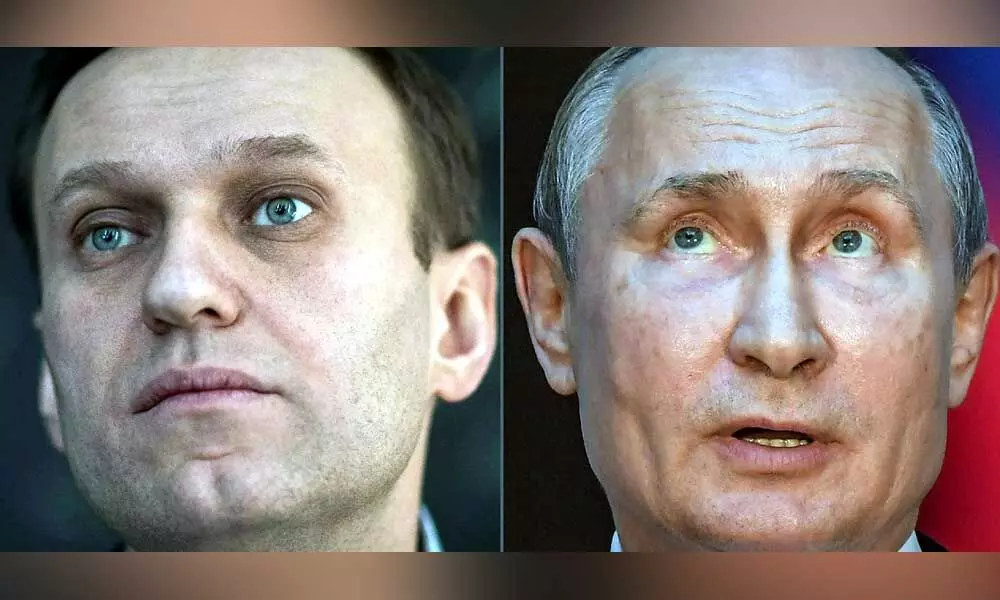The Russian affair: A tough nut to crack for EU!
EU unity on Russia can’t be expected any time soon. Despite mounting concern at Moscow’s behaviour in many capitals, there is widespread disagreement over how to respond, with national strategic and economic interests far from aligned
image for illustrative purpose

Asad Mirza
The recent demonstrations in Russia might have raised the West's hope to see an end to the Russian oligarchy, but it may turn out to be a wishful dream.
Over the last two weeks, many Russian cities including Moscow and St. Petersburg witnessed a second wave of public demonstrations in support of opposition figure Alexei Navalny.
However, the demonstrations were mostly against Kremlin's policies and less in Navalny's support. In most cities, demonstrators expressed frustration with Russia's coronavirus-related lockdown measures, anti-Putin sentiments and government's actions against other anti-establishment political activists.
Putin-Navalny fight
Russian opposition leader, politician, lawyer, and anti-corruption activist, Alexei Anatolievich Navalny came to international prominence by organising anti-government demonstrations and running for office to advocate reforms against corruption in Russia, President Vladimir Putin and his government.
Navalny's video of Putin's alleged palace on Russia's Black Sea coast has now been viewed more than 111m times. His detention and court appearance prompted the biggest street protests in Russia since 2011-12, with demonstrations in 180 towns and cities across Russia.
Navalny has also antagonised the Kremlin by calling on the West to impose personal sanctions on 35 individuals linked to Vladimir Putin. They include oligarchs, the judge who remanded Navalny in custody last month, and senior government figures.
Navalny poses a serious threat to the country's political elite. They don't seem to know how to handle him. If Navalny is kept in prison or released, his movement will be strengthened, and it has the potential to fuse to broader public dissent over Russia's long-term economic performance and government ineffectiveness.
Besides pro-Navalny support, other factors fuelling public anger are falling living standards, pandemic-related troubles, diminished political freedom, and Putin's decision to effectively remain in power beyond 2024. Many Russia observers are of the view that these demonstrations represent a new stage in Russian public dissent.
Emil Avdaliani, a professor at the Tbilisi State University in his recent paper for BESA Centre on the continuing demonstrations opines that the first indicator that these rallies are different is their sheer size. Totalling nearly 1,00,000 people, they were the largest nationwide displays of dissent in recent years. The detention of 3,700 people greatly exceeds the detentions that occurred during the wave of anti-Kremlin protests that rocked Russia in 2011 and 2012.
Moreover, these protests have spread countrywide. According to latest reports Russians in nearly 100 cities across the country took to the streets. Avdaliani opines that historically, Putin enjoyed the advantage of Russia's geography, which precluded the spread of public dissent. Much has changed, however, as modern technologies have enabled the coordination of simultaneous protests across Russia's vast territory.
The manner in which Putin and his cliques have handled the issue has catapulted Navalny into a celebrity. Currently, Navalny is Russia's second most prominent face and voice abroad after Putin, and has become a politician with global reach.
EU's response
Meanwhile, the internal affairs of Russia had an after effect on the manner in which the European Union functions. So far, the UK and EU have already introduced targeted sanctions over the poisoning of Navalny, and the EU is considering additional measures over his jailing and the subsequent crackdown.
The Guardian reported that the Russian Foreign Minister, Sergey Lavrov, has said that his country was prepared to break off relations with the bloc if there were any new sanctions.
But the inner EU wrangling may perhaps take a toll on the organisation's ability to handle international issues, as a unified response to the Russian affair has been missing, as the EU member states can't agree on how to handle Putin.
EU unity on Russia can't be expected any time soon. Despite mounting concern at Moscow's behaviour in many capitals, there is widespread disagreement over how to respond, with national strategic and economic interests far from aligned.
Meanwhile, Emmanuel Macron of France still favours dialogue and a strategic 'reset' in EU-Russia relations, while Poland and the Baltic States want far tougher action.
Judy Dempsey of the think-tank Carnegie Europe opines that Moscow prefers dealing separately with each member state, instead of EU as a bloc, and on the other hand most EU states don't know what they clearly want from Russia.
Meanwhile, Russia issued an international arrest warrant for Leonid Volkov, one of Navalny's senior allies, who is currently based in Lithuania.
Instead of the young crowd, the demonstrators have included middle-aged, middle-class Russians. These people are frustrated with the government's economic performance and corruption and the end result may not be what Europe wants -- an end to the Putin era.

